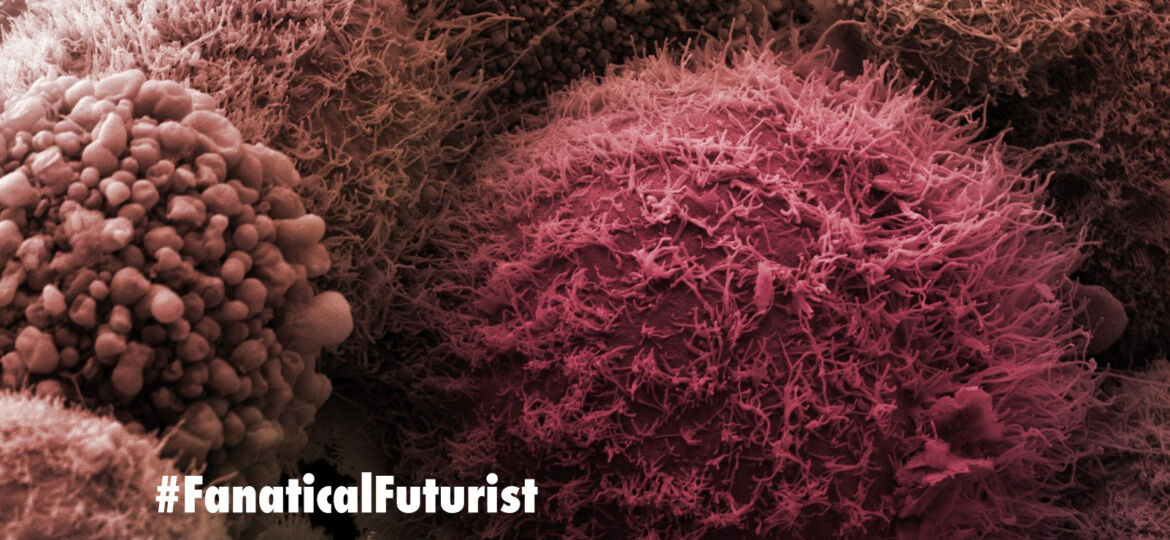
WHY THIS MATTERS IN BRIEF
Every year thousands of people die from Pancreatic Cancer, one of the most deadly forms of cancer, but now people can screen for it in the comfort of their own home using just their smartphone and an app.
Better screening tools for all Cancer would only be a good thing, but one type in particular where it could have a huge impact is Pancreatic cancer. The symptoms of this disease don’t often reveal themselves until it is well progressed, and it carries a five year survival rate of just a measly 9 percent, but scientists have now developed what could prove an exciting new diagnostics tool, in the form of a smartphone app that scans the white part of the eye for one of the deadly disease’s early tell tale signs.
Because it is so difficult to detect, sufferers of pancreatic cancer are often diagnosed well after the disease has already spread, and this means surgical removal of the tumour, the only potentially curative treatment, isn’t possible. One of the early symptoms of pancreatic cancer is jaundice which is characterised by yellowing of the skin and eyes as a result of a substance called Bilirubin in the blood. But the trouble with Bilirubin build up, other than the fact it can be indicative of a number of diseases, is that it can only be picked up by a blood test that physicians won’t administer unless there is already cause for concern.
Watch it in action
Now though, unlike some of the other emerging tests for Pancreatic cancer, such as a new urine test, the new smartphone based solution, which is part of a continuing trend to democratise healthcare that already includes using smartphones to detect and predict Arrhythmia, epileptic fits, inherited diseases, skin cancer, and the onset of more general illnesses, by listening to your voice, from the University of Washington (UW) would require no bodily fluids at all and can be done in the comfort of a person’s own home, or at the beach.
Dubbed BiliScreen, it uses a smartphone camera along with Artificial Intelligence (AI) machine vision and machine learning algorithms to detect elevated Bilirubin levels in the white part of the eye, known as the Sclera. In adults, the Sclera is more sensitive than the skin to increased Bilirubin levels, and the UW team’s new app can detect those changes before they become visible to the naked eye, when it is already too late.
“The eyes are a really interesting gateway into the body — tears can tell you how much glucose you have, sclera can tell you how much bilirubin is in your blood,” said senior author of the study Shwetak Patel, “our question was: Could we capture some of these changes that might lead to earlier detection with a selfie?”
They put the technology to the test in a clinical trial involving 70 people. The BiliScreen smartphone app was used in combination with either a special box made to control light exposure or paper glasses to calibrate colour and the team found it was able to correctly detect causes for concern 89.7 percent of the time compared to the conventional blood test.
It does this by using the camera and flash to capture an image of the eye, and then computer vision software to isolate the Sclera. The app software then assesses the wavelengths of light that are reflected and absorbed by the Sclera, calculating colour information and then uses AI to correlate that with Bilirubin levels.
“This relatively small initial study shows the technology has promise,” says co-author Dr. Jim Taylor, a professor in the UW Medicine Department of Pediatrics, “Pancreatic cancer is a terrible disease with no effective screening right now. Our goal is to have more people who are unfortunate enough to get pancreatic cancer to be fortunate enough to catch it in time to have surgery that gives them a better chance of survival.”
From here, the team is looking to build on its exciting early results by testing the app on larger groups of people at risk of jaundice and related conditions. They will also look to make the technology more convenient to use, by possibly removing the need for the box and glasses.
















